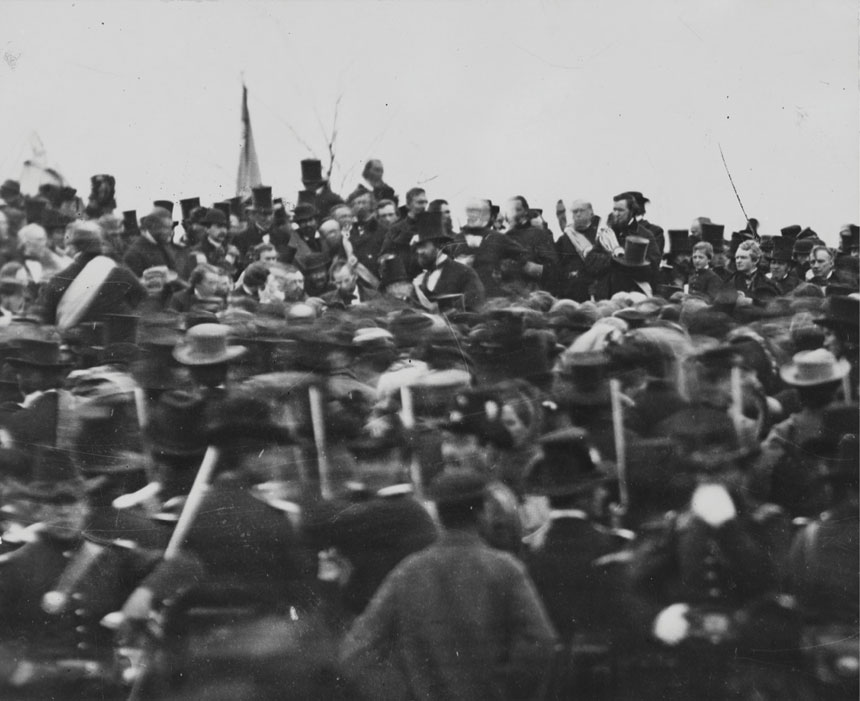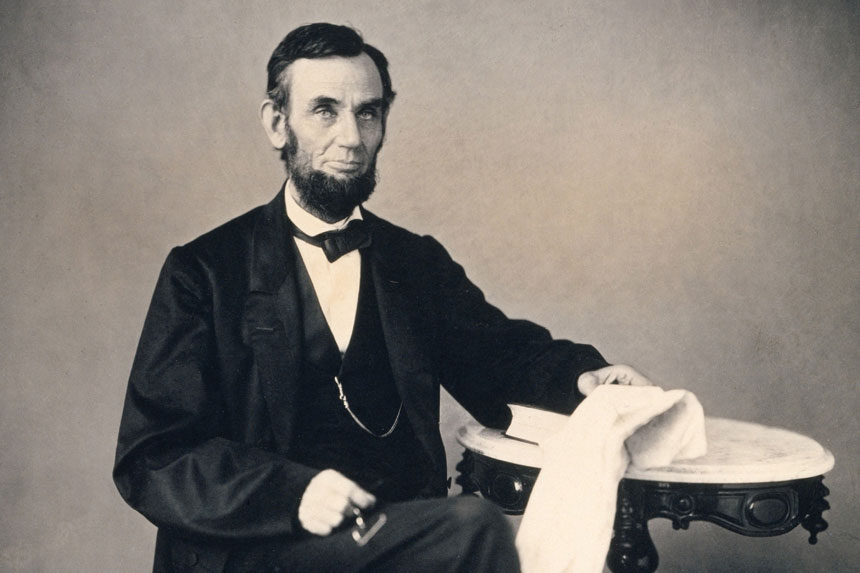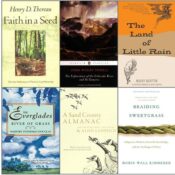Early in his presidency, with the dread specter of disunion hovering over the nation, Abraham Lincoln began invoking biblical imagery to explain what was at stake. He appealed to “Divine Providence,” “the Providence of God,” “that God who has never forsaken this people,” “without whose aid we can do nothing.” He gestured to “the Almighty,” in whose hands the fate of the Union rested. But it was not until the civil conflict began to claim thousands of lives weekly, and until death touched the Lincoln household in an awful, intimate way with the loss of his young son Willie, that religion became a commanding force in his personal and public lives. Lincoln’s spiritual turn combined a deep and probing exploration of divine intent and human agency, and stark political realism.
Abraham Lincoln, an erstwhile skeptic, was the first president to understand and channel the spiritual and institutional power of the evangelical churches. Over a century before Jimmy Carter became the first born-again resident of the White House and Ronald Reagan declared before the Religious Roundtable, “I know you can’t endorse me, but I want you to know that I endorse you,” Lincoln assiduously courted the Protestant clergy. Evangelical Protestants became the sturdiest layer of the Republican Party’s foundation and, by Lincoln’s design, a critical engine of its electoral success in the 1863 off-year elections and the critical 1864 national campaign. From thousands of pulpits across the country, each Sunday, evangelical clergy sustained support for the war effort even when the Union seemed lost and more sober voices called for an honorable settlement with the South. Lincoln’s pursuit of the religious community is an underappreciated feature of his presidency. “You may depend upon it, the Lord runs Lincoln,” a prominent Methodist layman proclaimed.
Lincoln’s personal faith and growing political reliance on evangelical voters deepened in tandem and led him over time to frame the meaning of the Civil War with words and cadences reminiscent of the King James Bible, a book he had memorized almost chapter and verse early in life, even before he was anything proximate to a believer. But Lincoln remained, as always, an iconoclast. Whereas evangelical leaders increasingly asserted that the Union was on God’s side, and God was on the Union’s side, Lincoln remained unsure. Unlike most evangelical Northerners, he did not believe in a personal God. Rather, he perceived God as a distant and unknowable force, his will mostly indiscernible to men and women. The war, Lincoln told Americans, was in some fashion divine retribution for the sin of slavery. Whether God willed that the North should win that war was another matter, and one of which he could not be certain.
As the fighting bore on, Lincoln came to view himself as God’s “instrument” on earth, meant to prosecute total war against the South until one side or the other lost. He had a role to play, one that had been divinely predetermined and from which he was powerless to break free. But he was genuinely unsure whether his was God’s favored side.
Lincoln called for a day of thanksgiving in August 1863 to celebrate the fall of Vicksburg to Ulysses S. Grant’s forces and the Union victory at Gettysburg the month before. Acknowledging that “these victories have been accorded not without sacrifices of life, limb, health and liberty incurred by brave, loyal and patriotic citizens,” and that “domestic affliction … follows in the train of these fearful bereavements,” Lincoln called on citizens to “recognize and confess the presence of the Almighty Father and the power of His Hand equally in these triumphs and in these sorrows.” God could determine winners and losers but also “subdue the anger, which has produced, and so long sustained a needless and cruel rebellion.” It could “change the hearts of the insurgents” and “lead the whole nation, through the paths of repentance and submission to the Divine Will, back to the perfect enjoyment of Union and fraternal peace.”
The president hardly exaggerated when he observed that “the religious people of the country” had extended him “the most unanimous support.” But his invocation of religion was not just the stuff of political design. Just prior to the Union’s costly win at Antietam in September 1862, Lincoln — who had drafted a preliminary Emancipation Proclamation but agreed to hold it until the next Union victory, lest it seem a measure born of desperation — informed his cabinet that he would regard the battle’s outcome as an indication of Divine will on the momentous issue of presidential emancipation. Even the final draft of the Emancipation Proclamation, which was in most respects a dry, legalistic document, included an appeal to God. Lincoln deliberately framed the order as a war measure, not a moral blow against slavery. He needed political cover: Conservative Republicans and War Democrats might accept emancipation as a means to weaken the Confederacy, but not as a war aim. He also needed legal cover: He had no authority to expropriate the property of citizens unless he did so in his capacity as commander in chief, in the service of putting down an armed rebellion. Still, at the urging of his treasury secretary, Salmon P. Chase, he closed: “Upon this act, sincerely believed to be an act of justice, warranted by the Constitution, upon military necessity, I invoke the considerate judgment of mankind, and the gracious favor of Almighty God.”
Lincoln’s wife Mary told William Herndon, Lincoln’s former law partner and later biographer, that for the better part of their marriage, “Mr. Lincoln had no hope & no faith in the usual acceptation of those words; he never joined a Church.” While she felt that Lincoln had always been spiritual in some indeterminate sense, it was only “when Willie died” that he began to turn to religion as a way to make sense of the tragedy that befell his family and the larger tragedy that enveloped the nation he had been chosen to lead. “He felt religious More than Ever about the time he went to Gettysburg,” she remembered, referring to his visit to Pennsylvania in November 1863 to attend the formal dedication of the Union cemetery. Though he was “not a technical Christian [he] read the bible a good deal about 1864.”
Francis Carpenter observed the same subtle transformation. An artist who lived in the White House for six months in 1864 while painting a portrait of the president, he believed that “during the last four years of [Lincoln’s] life he passed through what few men could have experienced without growth and change.” He told Herndon that “if you could have resumed your old intercourse with him at the end of his four years you would have found his religious sentiments more fixed, possibly more Christian for ‘deism’ is not Christianity.” When Noyes Miner, a Baptist minister and former neighbor from Springfield, paid a visit to the Executive Mansion, Lincoln shared his growing belief that it had “pleased Almighty God to put me in my present position, and looking up to him for divine guidance, I must work out my destiny as best I can.” Miner recognized in the president a man grappling to understand his role in a national tragedy, and struggling to understand what God wanted of him. The clergyman, who had known Lincoln as a nonbeliever, now believed that “if Mr. Lincoln was not a Christian he was acting like one.”

Lincoln’s brief remarks at Gettysburg revealed a president turning to the Bible for words that might make meaning of the carnage over which he presided. In the opening lines of his speech, he dated the nation’s founding to 1776, not 1789 — a subtle but important nod to antislavery radicals, many of whom had long held the Declaration of Independence as America’s true founding document, and not the Constitution, with its two-thirds compromise and recognition of the international slave trade. How he said it was almost as remarkable as what he said. “Four score and seven years ago, our fathers brought forth on this continent a new nation” might seem a florid way to say “eighty-seven years ago, our nation was born,” but to devout Christians, it was a familiar linguistic construction, similar to “threescore years and ten” (Psalm 90:10), “an hundred and fourscore days” (Esther 1:4), and “brought forth a man child, who was to rule all nations” (Revelation 12:5). When he continued, “We cannot dedicate — we cannot consecrate — we cannot hallow this ground,” he knowingly chose three purposeful verbs that appeared frequently in the King James Bible.
“We here highly resolve,” Lincoln closed, “that these dead shall not have died in vain — that this nation, under God, shall have a new birth of freedom — and that government of the people, by the people, for the people, shall not perish from the earth.” Here, with the words “a new birth of freedom,” Lincoln indicated a shift in the war’s meaning, from a battle to preserve the Union as it was, to a war that, should the Union win, would result in the death of slavery.
Joshua Zeitz has taught American history and politics at Cambridge University, Harvard University, and Princeton University. He is the author of several books on American political and social history and has written for The New York Times, The Washington Post, New Republic, and The Atlantic, among other publications.
From Lincoln’s God by Joshua Zeitz, Published by Viking, an imprint of Penguin Publishing Group, A division of Penguin Random House, LLC. Copyright © 2023 by Joshua Zeitz
This article is featured in the January/February 2024 issue of The Saturday Evening Post. Subscribe to the magazine for more art, inspiring stories, fiction, humor, and features from our archives.
Become a Saturday Evening Post member and enjoy unlimited access. Subscribe now




Comments
Really enjoyed learning more about Lincolns spiritual life. His son’s death leading Lincoln to more reliance and investigation of the Divine Providence of God. Having just lost my son I can relate to Lincoln’s yearning for answers. Only in the next life will we see what we have believed in the Bible. Faith is a powerful resource we can always turn to.
Christ’s message was one of love and compassion. Seems to me Lincoln shared that message. We need leaders who sing from the same hymn book as Christ and Lincoln.